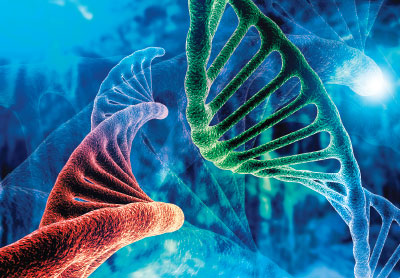The 2019 approvals of the medications esketamine and brexanalone ended a decades-long drought of antidepressant drug discovery and sparked excitement throughout the field. Where might the next antidepressant breakthrough come from? A protein known as GPCR56 is one promising candidate, according to a report in Nature Communications.
In a series of studies involving patients, mice, and postmortem brain samples, researchers at McGill University and colleagues showed that increased expression of GPCR56 was consistently associated with fewer depression symptoms. GPCR56, which stands for G-protein coupled receptor 56, is involved in a number of brain functions including the development, movement, and repair of neurons.
The researchers, led by Gustavo Turecki, M.D., Ph.D., chair of psychiatry at McGill and head of the Depressive Disorders Program, first identified GPCR56 through an analysis of blood samples taken from 237 adults with depression who participated in an eight-week clinical trial comparing the efficacy of duloxetine versus placebo. They identified 40 genes whose expression went up dramatically in people who responded to duloxetine. The expression of these genes did not change in people who did not respond to duloxetine or people who experienced symptom improvements while taking placebo. Of the 40 genes, GPCR56 had the greatest uptick in duloxetine responders.
The team followed up this analysis in two independent studies. One eight-week trial compared blood samples in depressed patients (63 participants) who received citalopram versus placebo; another tracked changes in blood samples of people taking antidepressants as well as healthy controls over 30 weeks. In both cases, blood tests showed the same results: People who responded to antidepressants had dramatically increased levels of GPCR56 compared with people who did not respond to antidepressants. An analysis of postmortem brain samples from people who were depressed when they died revealed they had much lower levels of GPCR56 than samples from individuals without depression.
Next the team examined the role of this receptor in mouse models. By reducing GPCR56 gene expression in the brains of mice, they could induce depressive-like symptoms. Likewise, if they induced depressive-like symptoms in the animals via stress but then raised GPCR56 gene expression, they could reduce these symptoms.
“Importantly, we could recreate these antidepressant-like effects if we directly manipulated the receptor using an agonist to stimulate the protein,” Turecki said. Such direct receptor activation opens the door to drug development.
What’s exciting, Turecki added, is that the G-protein receptor family is no stranger to drug development. “A lot of existing medications across specialties work by targeting these proteins,” he said. (One recent analysis reported 128 FDA-approved G-protein drugs, including psychotropics like clozapine, naltrexone, and vilazodone.) “Pharmacologists know how to work with these receptors.”
Even before any drug materializes, this study suggests GPCR56 measurements in the blood might serve another purpose. “One of psychiatry’s holy grails, so to speak, is to find easily accessible biomarkers of drug response, since access to living brain tissue is not possible,” Turecki said. “That we found a consistent association between changes in GPCR56 expression and antidepressant response across three separate groups using different medications is encouraging.”
This research was supported by the Canadian Biomarker Integration Network in Depression (CAN-BIND) program, with additional funding from the Ontario Brain Institute. The researchers analyzed blood samples from patients who participated in clinical trials sponsored by Lundbeck and were donated to CAN-BIND. ■
“GPR56/ADGRG1 is Associated With Response to Antidepressant Treatment” is posted
here.


